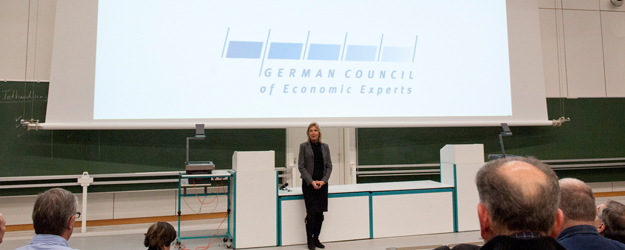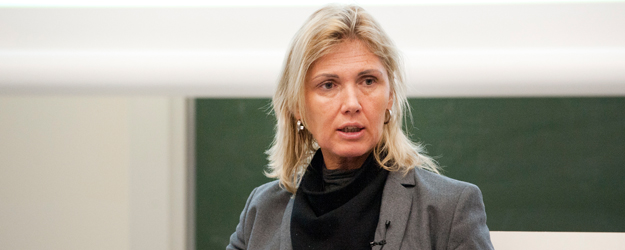7 December 2011
Beatrice Weder di Mauro presented the Annual Report of the five-member German Council of Economic Experts at Johannes Gutenberg University Mainz (JGU). This council, which has included Weder di Mauro since 2004, is suggesting a redemption pact for the euro area as a way out of the current crisis.
On the screen in the RW 1 Lecture Hall in the Law and Economics Building, the title of the report stood out in large letters: "Assume responsibility for Europe: From the banking crisis to the debt crisis - and back. The Annual Report of the German Council of Economic Experts 2011."
Professor Dr. Beatrice Weder di Mauro would have liked to have been in Mainz a lot earlier to present the suggestions of the five Economic Experts, but as a member of the German Council of Economic Experts, her schedule is quite tight. "Since our report was published, we've been absolutely inundated with e-mails and questions from economic as well as political circles," she said.
An island of bliss in a stormy sea
Weder di Mauro described Germany with its special business cycle as an "island of bliss." Unemployment numbers are on the decline. "We believe," she noted, "that this trend will continue." The Council also predicts an average growth rate of 0.9 percent for 2012. "This will come primarily from the domestic economy. In the past, foreign trade has been the driving force."
But, this German island is in the midst of stormy seas emanating from the turbulence in the euro area. "What's happening here is not so unusual," explained the professor, "it is just unusual for Europe." It is usually emerging countries that get sucked into this kind of vicious circle of banking, currency and debt crises. "We have a dramatic situation. Rescue attempt follows rescue attempt, but they seem to be losing substance."
In principle, the countermeasures that were agreed in the EU Summit on October 26th were correct. But, as Weder di Mauro noted, "they were only partially implemented and what followed tended to be counterproductive."
Less options available
The euro area is now faced with a shrinking number of options, all of which have their drawbacks when looked at closely - even rapid spending cuts cannot reduce the deficit fast enough and it takes time before reforms can be effective. If countries were to leave the euro area, this would be expensive for all the other partners. As Weder di Mauro clearly pointed out, "this option is like shooting yourself in the head." Moreover, if the European Central Bank guarantees set interest rates for countries, this will only temporarily stabilize the situation and will tempt countries to abandon discipline over the long run. The same holds true for Eurobonds.
The economic experts on the council have another proposal - a redemption pact. Alexander Hamilton, one of the founding fathers of America, took this route in the 18th century. He consolidated old debts so that they could be paid back through a special tax over a long period of time. "This is the basic idea behind our redemption pact," explained Weder di Mauro.
Transfer of debts to redemption funds
The euro area countries should put all debts exceeding a debt ratio of 60 percent of the gross domestic product into a redemption fund. This sum would be about 960 billion for Italy and about 580 billion for Germany. With this "common pot," Germany would have to pay higher interest for redemption, while Italy would pay a lower interest rate. For Germany, this would mean more costs, as Weder di Mauro clarified, "but we can limit and put a figure to these costs, in exactly the way the Federal Constitutional Court specified." As a second pillar, the participating countries should initiate credible disciplinary measures if any country deviates from its path of consolidation. This is the plan as set forth by the experts.
Greece is an exceptional case
Weder di Mauro ended her talk with "now I am looking forward to answering questions." And there was indeed no shortage of questions. What will happen with Greece? "This is an exceptional case. Greece needs a debt write-off." What does the Chancellor think about these suggestions? "Mrs. Merkel said: 'we have questions.'" And what could happen in the worst case scenario? "The euro area could fall apart uncontrollably." After one and a half hours, Weder di Mauro commented: "I hope I have been able to convince a few people that our proposed path is a good one." At any rate, outside of the lecture hall, both economists and politicians have been showing a lot of interest in this path.



